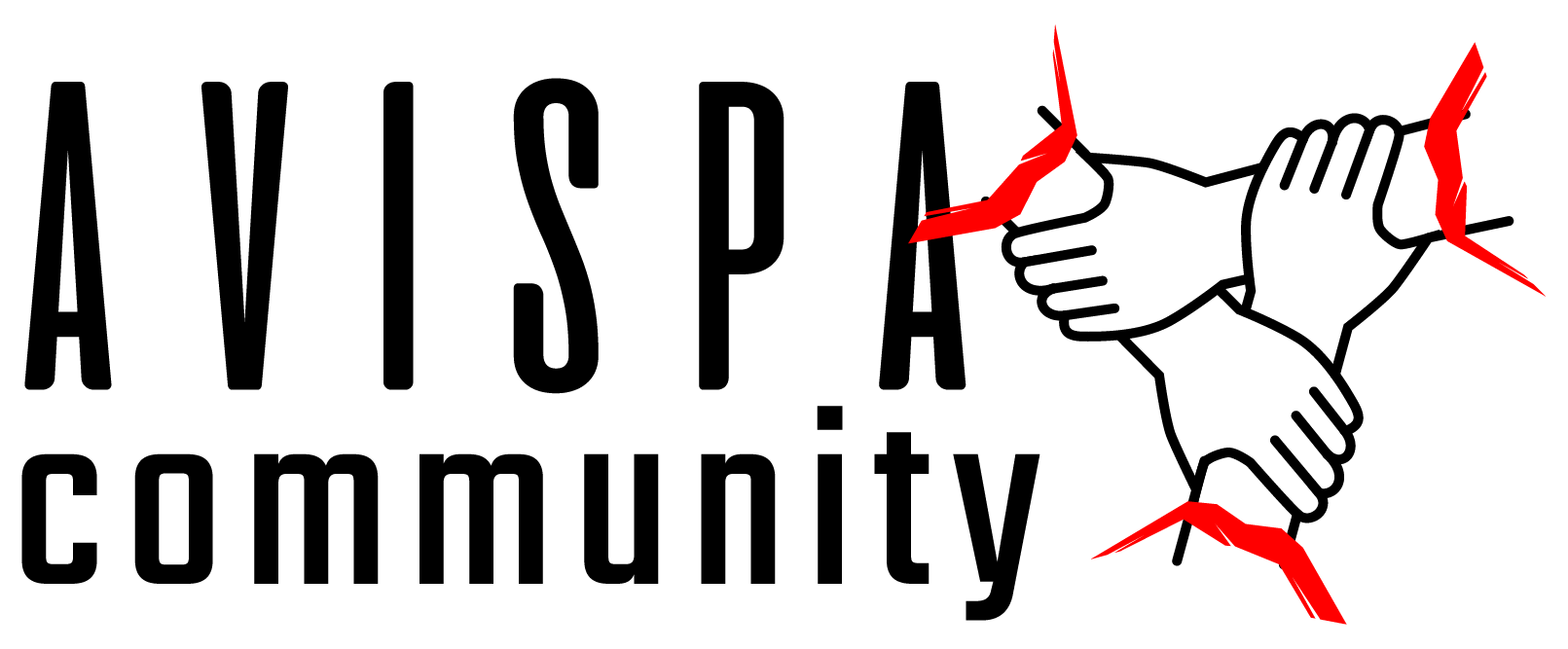Photos taken from a video showing the violent military incursion in the Ejido Nuevo America in the border region between Chiapas and Guatemala.
On Tuesday, January 16, members of the Mexican Military and the National Guard violently attacked the Ejido Nuevo America in the municipality of Chicomuselo where inhabitants had put up fences to prevent the entrance of armed groups who were fighting in the region during the night of Monday, January 15.
Since 2021, the border region with Guatemala has seen a crisis of violence and insecurity. Testimonies have described a war between the Sinaloa and Jalisco New Generation cartels, whose violent clashes have caused the forced displacement of thousands of people.
Through an urgent communique, the Civil Society of the People of Chicomuselo made a call to the international community to denounce that, in addition to organized crime violence, they are now being attacked by armed forces “who are violating decisions made by civil society to protect their towns from increasing violence and clashes between cartels.”
Before the arrival of the military, inhabitants of the Ejido Nuevo America and other communities surrounding the Belisario Dominguez Dam, solicited dialogue with the armed forces to explain to them the reasons for the fencing. Yet the armed forces refused. Rather they have accused the population of belonging to the criminal groups.
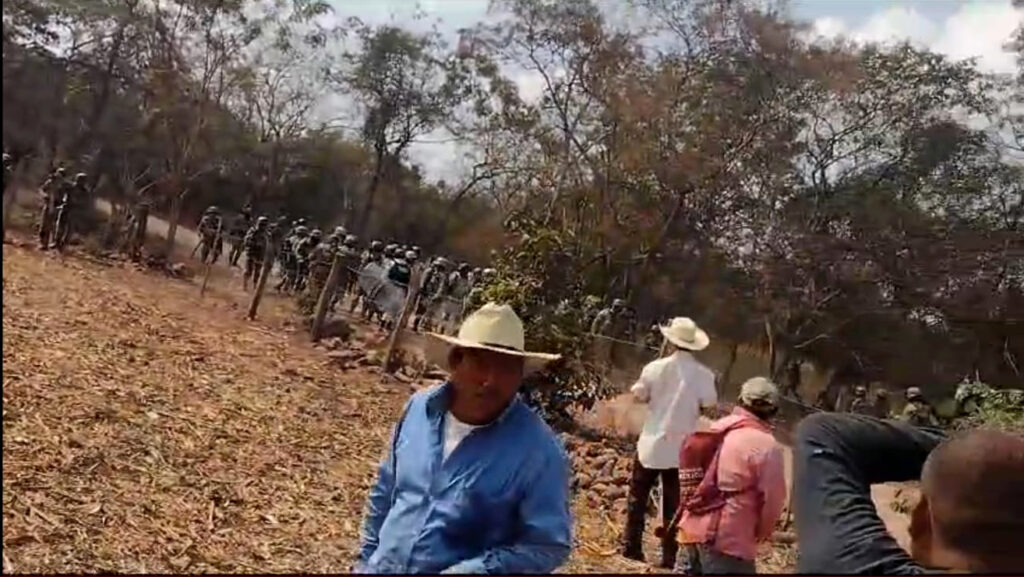
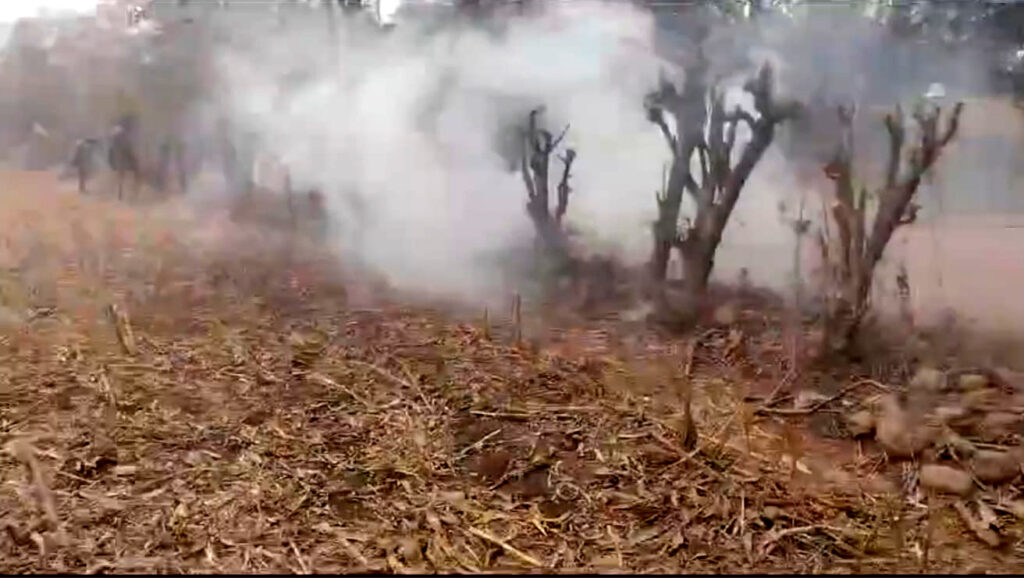
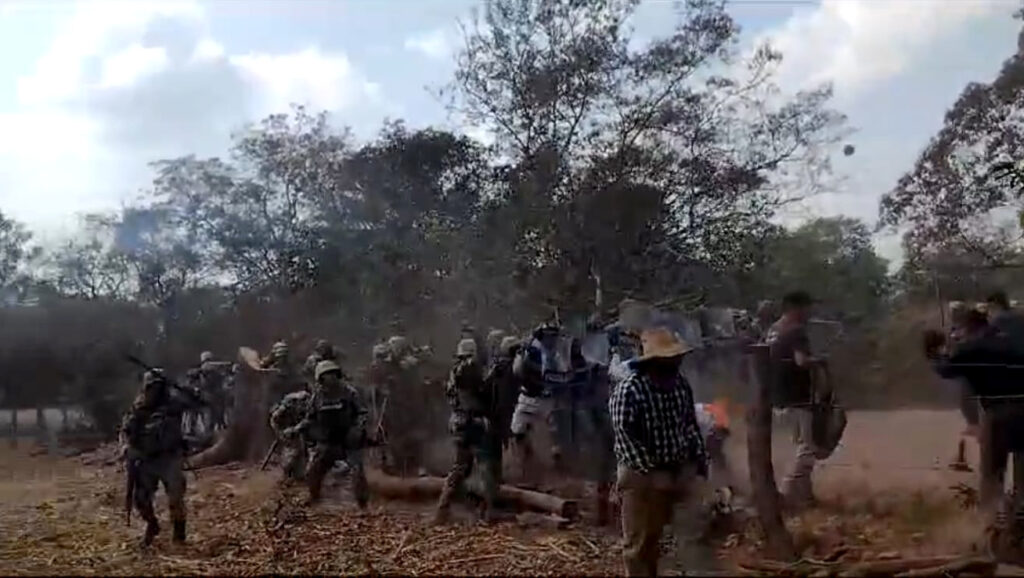
Photos taken from a video showing the violent military incursion in the Ejido Nuevo América in the border region between Chiapas and Guatemala.
“The population is asking why the location of the criminal groups isn’t being raided, or why aren’t the highway blockades held by criminal groups for over two years being removed. Instead they attack the communities where people are organizing to protect their ejidos,” say the inhabitants.
Through videos circulated on social media, the violent incursion of the Military and National Guard can be seen in spite of attempts for dialog by the local population.
A testimony shared by Radio Zapatista indicates that elements of the Military threw stones and tear gas against campesinos. “They were carrying poles, they broke the lines of the campesinos and the people had nowhere to go, they couldn’t hold on,” detailed the anonymous testimony. Through the audio, it was explained that there was no violent response on part of the campesinos in spite of the aggression of the soldiers who injured inhabitants and detained two people.
As a result of the attack from the armed forces, reports indicate an increase in the number of displaced families, due to the ongoing violence between communities located on the border of the lake also known as “La Angostura.” In addition to these populations, there are other ejidos where people are forced to migrate due to the fear and terror of the violence they are experiencing.
According to the communique, the towns affected are: Rizo de Oro, Guadalupe Maravillas, Perlas del Grijalva, Resplandor, Retiro and San Isidro of the municipality of Concordia. Puerto Rico and Chejel of the municipality of Socoltenengo. Julio Sabines, Benito Juárez, Nueva América, Corona del Rosal, Pablo L. Sidar, Raizal, Madero, Nueva Morelia, Limonar, La Lucha, La Unión, San Francisco, La Pinta, San Ignacio, Sabinalito, Las Flores, San Antonio Ocotal, 20 de Noviembre, Piedra Labrada, Lázaro Cárdenas, and the municipal seat of Chicomuselo.
The testimony shared by Radio Zapatista states that the situation is serious because the families—many with children and sick people—have fled to the mountains and toward the lake. “The other problem is that nobody can move them across the lake. The people who drive the boats have also left. It is chaos here on the banks of the lake. It is horrible, the houses are shut, everything is closed. They abandoned their animals, their livestock, cattle, and horses. Their cars could no longer pass to the other side of the lake. There were also women who fled running because of the teargas. The armed forces also fired shots,” narrates the audio.
In the communique, the population questions why the armed forces allowed criminal groups to run off various communities while they attacked the people without intervening against the armed groups.
“Why do they violate the communities in resistance?” they ask in the document disseminated after the aggressions. “All confidence has been lost in the Military and the National Guard of the 101-infantry battalion located in the municipality of Chicomuselo. They’ve only acted against the population which seeks to protect themselves rather than against those who are threatening, assassinating, and kidnapping the people. This is the case of Chicomuselo, Comalapa, Siltpec, and Amatenango, where there are permanent checkpoints of criminal groups who are reviewing cell phones and backpacks, covering a price to pass or to sell products, controlling prices and harvest times of the campesinos,” they detail.
Militarization and Organized Crime Go Hand in Hand
International human rights organizations who work in Chiapas and southern Mexico including the Swedish Fellowship of Reconciliation (SweFOR) and the International Service for Peace (SIPAZ) disseminated a communique expressing concern over the armed violence that has plagued the region since 2021.
In a document, they state that the confrontation between criminal groups “is greatly impacting the civil population, through acts of forced disappearance, torture, forced recruitment, sexual exploitation, extortion, displacement, and other strategies of population control.”
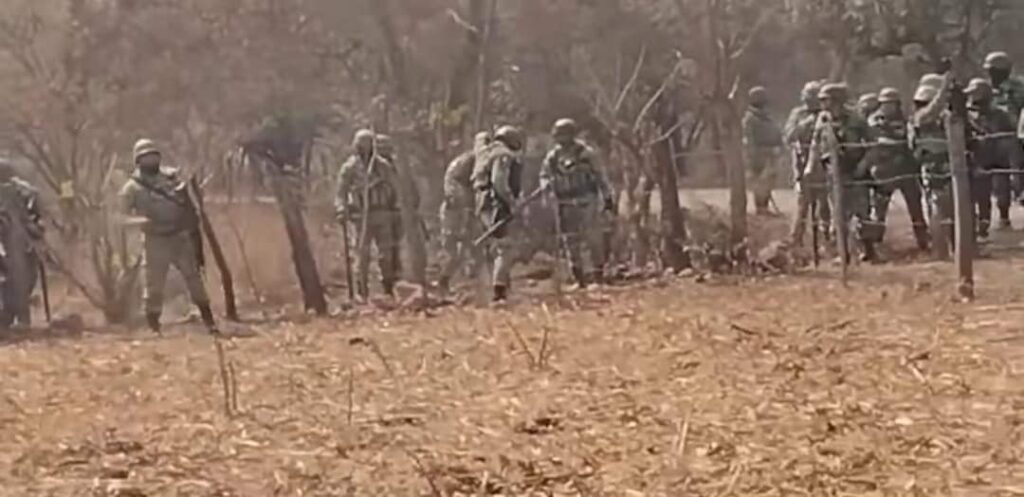
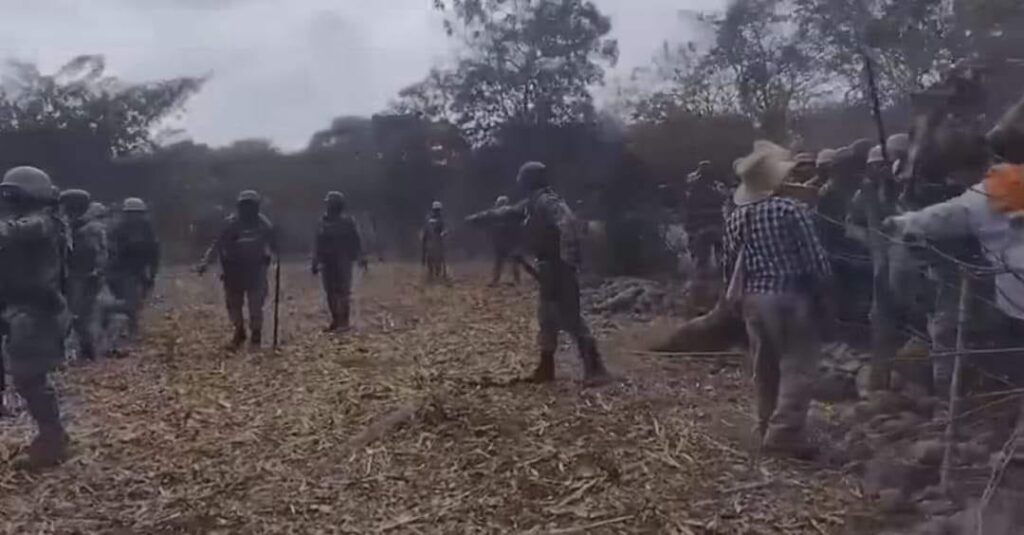
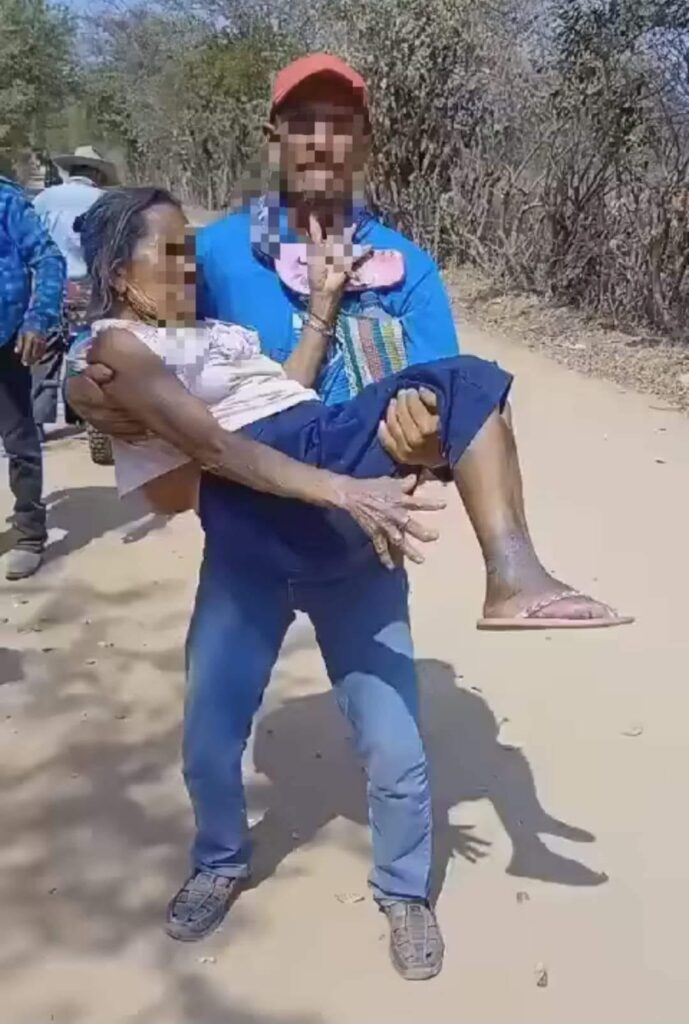
Photos taken from a video showing the violent military incursion in the Ejido Nuevo Amarica in the border region between Chiapas and Guatemala.
They emphasize that the panorama of violence is specifically dire for human rights defenders. “We have received information from the border region of Chiapas and Guatemala of cases of assassination, torture, and disappearance against human rights defenders who carry out the work of denouncing human rights violations, refusing to support one side or the other. This has led several human rights defenders to seek refuge far from their communities suspending their activities in defense of human rights,” they contextualize.
According to the organizations, this scenario is developing due to the inaction of the authorities, “militarization of the entire state being the only response without a consistent effect in stopping the violence,” they explain.
They emphasize that Chiapas is one of the most militarized states in Mexico. According to statistics from the Secretariat of National Defense (SEDENA), as of July 2022, there were 17,160 elements of the Military and National Guard deployed there.
“The exponential growth of violence and state omission is resulting in the complete closure of the space of action for human rights defense. We are worried that in this context, they are not implementing mechanisms for protection of the activists,” explain the human rights organizations.


